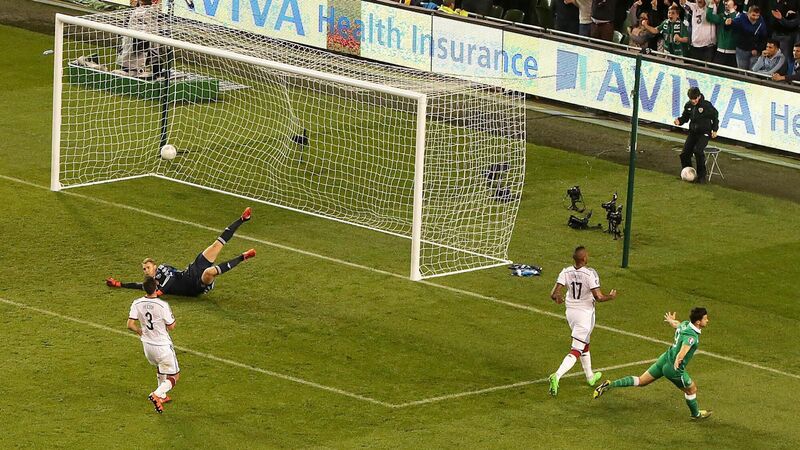John Fallon: Government funding allows Ireland to dream of regular finals qualification

10 YEARS AGO: Republic of Ireland's Shane Long celebrates scoring the famous winner against World Champions Germany. Pic: ©INPHO/Morgan Treacy.
Ten years ago today, Ireland shocked the world champions to accelerate a major tournament appearance. Today’s the day Ireland can finally contemplate qualification on a regular basis.
It will take years, potentially a decade, for that status to materialise but at long last, through an unintended consequence of Brexit, the Government are devoting funds to producing home-grown talent.
Elite was a word overused in the afterglow of yesterday’s announcement of €3m to stimulate a club-led academy development model.
It certainly cannot be categorised into grassroots, as minister for public expenditure Jack Chambers entitled it, but the more appropriate description is supporting the development of high-potential footballers, male and female.
Mason Melia and Victor Ozhianvuna are examples. Combined, they’ve grossed upfront fees of €4m for St Patrick’s Athletic and Shamrock Rovers from their transfers at 18 to Tottenham and Arsenal respectively.
Owen Elding from Sligo, Michael Noonan of Rovers and Cork City’s Cathal O’Sullivan are others likely to fetch significant fees from English clubs after turning 18.
Whereas these are outliers, the purpose of the investment is to engineer a conveyor belt of gems.
Most will enjoy job security in the League of Ireland, many will command fees by fulfilling their ambition of transferring abroad and a cohort will spearhead the Ireland international team. All boats are intended to rise.
This is an example where the symbolism surpasses effect from an action. Split between the 26 academies, and subtracting the 19% centralised into the FAI for technology and auditing, the payout for each equates to just under €100,000.
That’s not going to be a panacea for the dearth of capable midfielders lining up against Portugal on Saturday.
What’s imperative from the Budget announcement was the landmark aspect, a first for football, but also a commitment for the grant to become multi-annual.
Were the request to be granted on the same basis as this first year, specifically 66% of €4.45m, it would result in €5.3m being pumped into the system.
Not quite the €8m per-annum peak being sought to fund the overall €16m estimated to close what the League of Ireland department brand the “gap” to European peers.
The FAI’s dire financial state of still servicing €40m of debt restricted their yearly payout to a measly €10,000 per club and, even with the Uefa solidarity pot rocketing to €368,000 for Premier clubs, it falls short of the required subvention.
As the State acknowledged, and is accepted by LOI clubs, the FAI have been provided with an injection to “kick-start” their academies programme.
It’s understood an initial agreement for €2.6m to be ringfenced was agreed in principle last week but that increased in recent days.
The specific pre-Budget proposal submitted centred on creating 81 jobs in the first phase, broken into an academy director, head of coaching and an academy administrator for each.
The pace of that may be staggered, delaying the appointment of the third person until next year’s portion is allocated.
All going to plan, the ‘industry’ will be comprised of 201 full-time staff across the club network, aided by 139 additional personnel operating part-time roles.
This breakthrough follows 18 months of intense lobbying by the football fraternity.
Of most magnitude was a meeting hosted by Paschal Donohoe, the Minister for Public of Expenditure and Reform, welcoming a delegation from the FAI and League of Ireland in July 2024.
That Donohoe’s retired Fine Gael colleague, Michael Ring, was invited to join the National League Committee in March of this year was another encouraging step.
He was once sports minister in an era when the League of Ireland was dismissed as a “difficult child” by its parent, the FAI’s chief executive.
League of Ireland academy manager Will Clarke was central to the talks after his annual presentations spelt out the repercussions of the investment deficit.
Ireland’s presence across the top five leagues in Europe, especially the English Premier League, has been in decline for decades and predicted to worsen unless direct action is taken in providing the environment to develop the next generation.
Once the Department of Sport granted funding for the League of Ireland to engage a specialist company, Belgian outfit Double Pass, to audit the requests from clubs, traction was generated. This quest had cross-party support.
Those TDs and senators sampling the rising tide of the league on a Friday night couldn’t be seen to simply pledge their backing to the game by endorsing the State’s expenditure on co-hosting Euro 2028.
Not even the latest scandals within the FAI, played out in public at their abysmal appearance before the Joint Oireachtas Committee for Sport two weeks ago, could derail what is a necessary and overdue contribution from the exchequer.
Any fears of the monies being rerouted into first-team wages can be allayed by the rigour with which Sport Ireland evaluate the club applications. The Government agency has responsibility for discharging tax-payers funds in this case, not the FAI.
Within the overall spend, this is a miniscule payout yet means the world to a sector for too long starved of sustenance.
Jubilation was in the Turner’s Cross air last Friday as Cork City reached a first FAI Cup final for seven years, but recriminations over imminent relegation weren’t far away.
Ger Nash plans to stick around for next year’s First Division title tilt, but the manager has been clear about what he feels is essential for the yo-yo tag to be shed.
The man appointed boss in May for his first managerial role is eager to rebuild from a nucleus of reliables, preferably based locally and who aren’t angling for their next move.
Fitness has also been floated. Within a week of his appointment, Nash spoke of introducing double daily training sessions to cope with the demands.
At one point, there was talk of players being overworked but the chief is only replicating a regime he was accustomed to at Ipswich Town, Aston Villa and Swedish club GAIS.
He added: “Somebody asked me a question the other day, if we get relegated, will we stay full-time?
“We haven't been full-time but we're going to go full-time now in the way I think we should be working.
“I've worked 20 years in the game. Okay, not in Ireland before, but the way we’re working is more than what it was when I first came to the club, that's for sure.”
Ouch. That’s bound to hurt his predecessor, Tim Clancy. It may not be all sweetness and light heading into the November 9 decider.
Two stalwarts of Irish football who died too young, Dr Tony O’Neill and Ollie Horgan, have been remembered in poignant short documentary videos available on
It was in October of 1999 that the man known simply as The Doc passed away at 53.
He was known nationally for serving as general secretary of the FAI during the Jack Charlton era and as League of Ireland president but it was the strides made at UCD that he was proud of and left a legacy.
From the first recipient, Keith Dignam in 1979, the college has since granted 300 sports scholarships to players.
One of those, Ronan Finn, has returned to the club after success elsewhere.
He’s interviewed alongside Dick Shakespeare and Tony McDonnell.
Meanwhile, there was deep shock in football circles when the death of Ollie Horgan was announced in August, at just 57.
Like The Doc, he dedicated his life to family, football and education, coaching local, provincial and national schools' squads before, most notably working wonders over nine years at Finn Harps.
He assisted John Caulfield in his native Galway for the last three years of his life. Many of Ollie’s magic moments are captured in the footage crafted by Press Record Videos.



